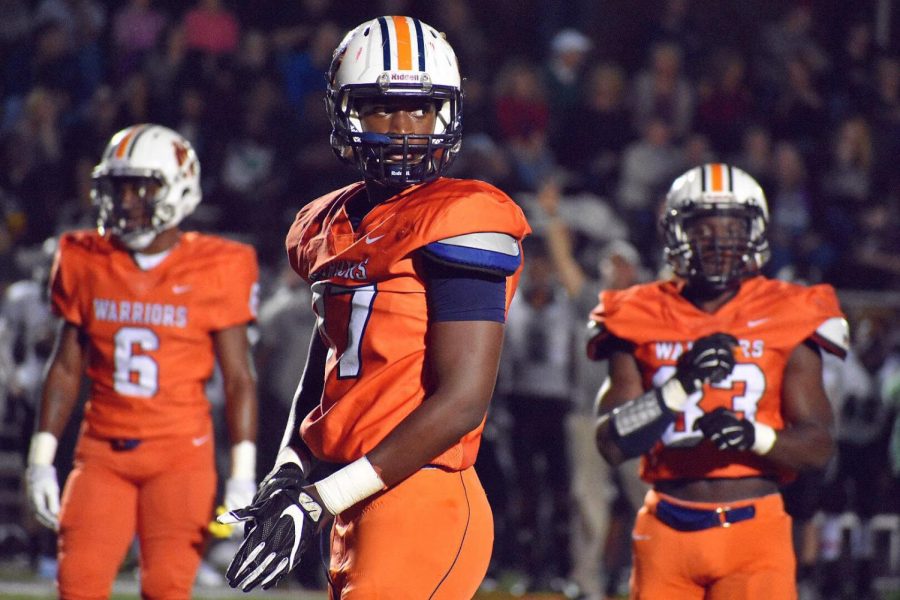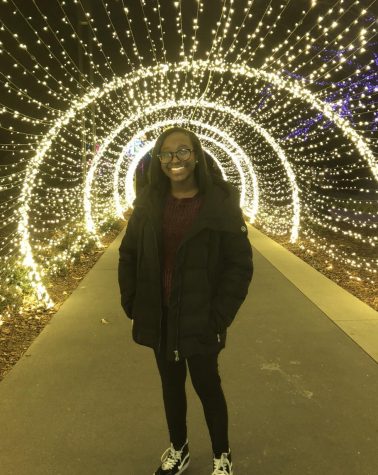Athletically and academically strong, Oppan signs with Duke
Senior and defensive end on NC’s varsity football team, Caleb Oppan, recently committed to Duke University. Although high school athletes want to continue playing though college, The National Collegiate Athletic Association reports that only 480,000 of the 8 million athletes participating in high school sports will continue competing at NCAA schools. Once accepted, athletes must concentrate on excelling in training as well as their academic endeavors. According to Oppan, his life already revolves around football. “Everything I do outside of school is sports-related,” Oppan said.
January 22, 2019
According to a survey conducted by The National Collegiate Athletic Association, 1,057,382 students participated in high school football, but only 6.9 percent of them continued playing in college in the 2016-2017 school year. This year, defensive end on NC’s varsity football team, senior Caleb Oppan, joined that small percentage by committing to Duke University.
“Caleb is a leader on and off the field. He plays with a high motor and is always near the ball. His work ethic is superior and has given him a chance to play [Division I] ball,” head coach of JV and Varsity football Shane Queen said.
Oppan began playing football at 12 years old, and made NC’s varsity football team as a sophomore. Duke sought Oppan out in December 2017 and despite receiving offers from several schools—including Vanderbilt and Syracuse—he favored Duke’s coaching staff and environment the most.
The NCAA recruiting process involves campus visits, observations/evaluations by coaches or recruiters, verbal commitment, and—ultimately—official commitment, when the student athlete signs a National Letter of Intent.
“The environment and type of education I’ll get there was important to my family and [me], so I chose Duke,” Oppan said.
For aspiring professional athletes, the transition from high school to college requires above average grades, maturity, and flexibility. Training in college intensifies, and athletes form close-knit relationships with their new teammates. The competitive scope of college football recruitment leads to teams that consist of the most talented players from high schools across the country. At a strong academic school like Duke, athletes must balance rigorous coursework and athletics.
“[Division I] coaches look for student athletes that have great grades, high character, and are good teammates. Caleb has all of these intangibles and will continue to be a great player at Duke,” Queen said.
Oppan prepares for games by listening to music, watching game tapes, and visualizing himself on the field. During his time on the football team, he learned important lessons about discipline, focus, humility, and sacrifice— all of which will help him in the next chapter of his life.
“The past four years prepared me for Duke by helping me understand [that football is] a team sport and it’s not always about winning,” Oppan said.
Oppan will continue playing defensive end at Duke, among other positions if needed. He looks forward to the change of scenery, but will miss the camaraderie with his teammates and the support of his coaches.
While Oppan regrets the team not making it to the playoffs in his final season at NC, he leaves with only positive memories of his time playing here, and he also leaves behind a legacy of sportsmanship and dedication for others to follow.
“Caleb Oppan is not only a good football player, he is an even better young man,” Queen said.






Da'Naija Holloman • Jan 23, 2019 at 11:36 AM
Wooooooooooo!!!!!!!!!!!!!!! GO CALEB!!!!!! GOOOOOOOO BLUE DEVILS!